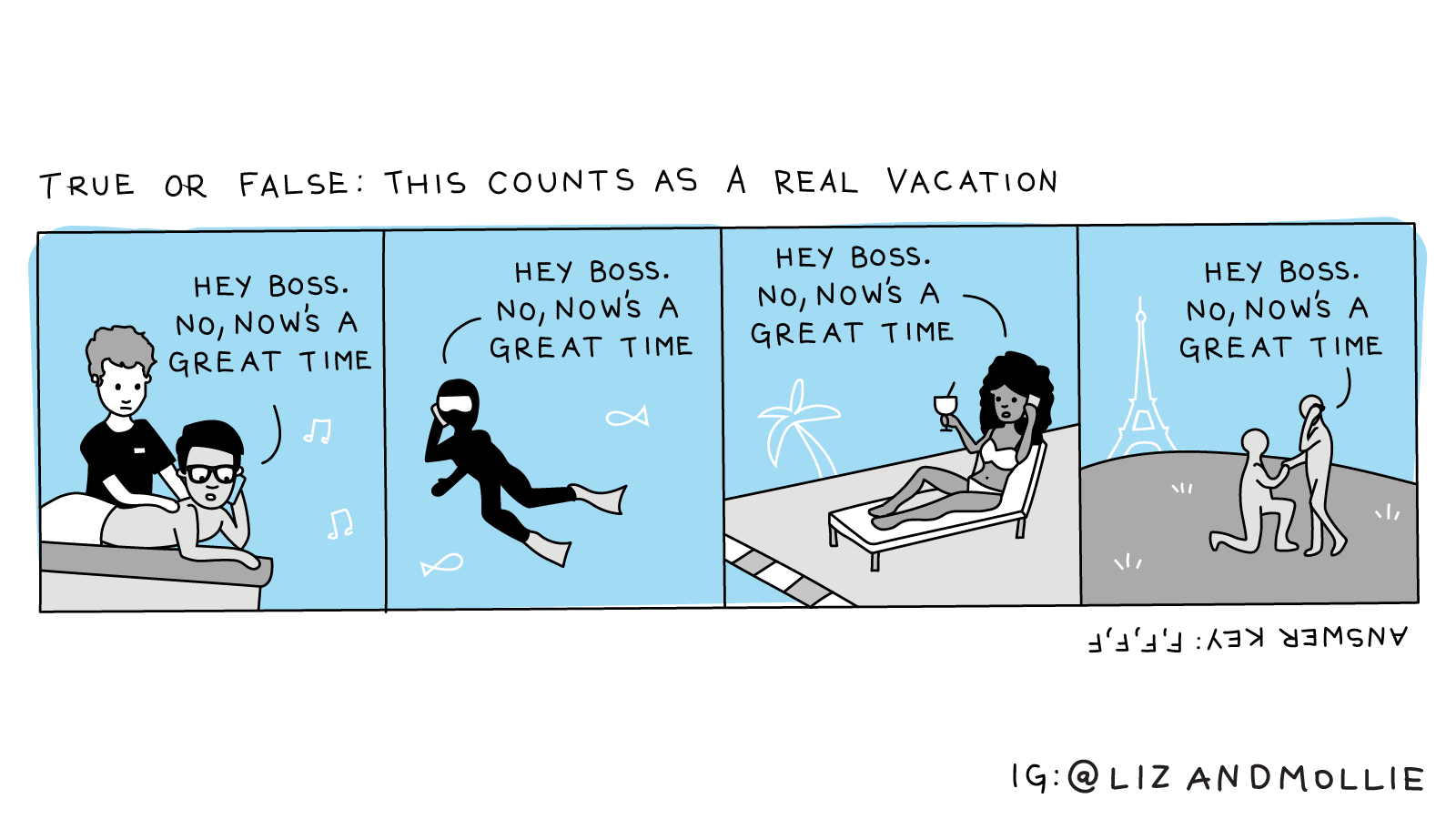In 1996, Steelcase, a large office furniture manufacturer, installed a four by six foot glass display in the lobby of its Manhattan headquarters. Inside the display case was a colony of harvester ants meant to show how “Ants live to work, and work to live.”
Unfortunately for Steelcase, the public wasn’t thrilled with the analogy. The Wall Street Journal pointed out that because harvester ants live only about three or four months, Steelcase’s motto should be, “You work, and then you die.” But Steelcase was right: advances in technology have blurred the lines between our personal and professional lives. We’re constantly accessible, which means we feel constantly accountable.
Some of you may be thinking, wait a second, this is all super dark—isn’t it okay to be passionate about your job? Yes! Odds are, at points in your career, you should apologetically back out of dinner plans because you need to solve a problem for your boss. But chronically overworking is bad for your health and—counterintuitively—for your success. In fact, productivity starts to drop after working about fifty hours per week. Perhaps you’ve heard the old saying, “Work expands to fill the time available for its completion.” In other words, giving yourself less time might make you more efficient.
“I wish I could go back and tell my much younger self, ‘Arianna, your performance will actually improve if you can commit to not only working hard but also unplugging, recharging, and renewing yourself,’ ” reflects Huffington Post founder Arianna Huffington. So how can you emotionally detach from even the most demanding job?
Give yourself a break
Go on vacation: Extended time off keeps us healthy and productive, especially if we have little or no contact with our colleagues while we’re away. But more than half of Americans don’t take all of their paid vacation. It’s hard to head to a remote island when the thought of being away from your email for a day leaves you wracked with guilt. Liz used to fear even asking for vacation be- cause she thought her bosses might view her as unreliable. Managers, how you talk about vacation matters. A lot. The majority of employees say their managers communicate nothing, negative messages, or mixed messages about taking vacation; with a little more encouragement, almost every- one would use more vacation time. For those of you whose managers do discourage taking a vacation, the next few paragraphs will be helpful.
Take a night off: Scheduling leisure time throughout the workweek is just as important as taking vacation—and often easier to swing. When the Boston Consulting Group instituted a predictable time off (PTO) policy that gave each member of a six-person team one weeknight off a week, employees became happier, more relaxed, and less likely to quit. Team members also learned to be more mindful of one another’s well-being. “Even if we were working hard,” noted one consultant, “we were still looking out for each other to make sure that people were not getting burned out.”
Getting a night off also gives you a chance to catch up on sleep. When they haven’t gotten enough rest, surgeons slip and drivers crash. Sleep deprivation also makes us gloomy and anxious; if we’ve been up too long, we start to perceive friendly-looking faces as menacing. So when you haven’t slept well, we recommend taking this sound advice from Mollie’s mom: “You’re not allowed to make judgments on your life when you’re short on sleep.”
Block off a day: One day every week, Liz does not let herself schedule meetings, calls, or even social events. This off day lets her catch up on her work, so the rest of the week doesn’t feel quite as hassled. If you can’t block off an entire day, try blocking off a few hours for focused work.
Make room for minibreaks: Stepping away from your desk for even five minutes helps you relax—and stay focused. Danish students who were given a short break before taking a test got significantly higher scores than their peers who didn’t get any time to relax. Research also suggests taking a few minutes to chitchat with your coworkers will help you de- stress faster than a solo break.
Set up an after-work ritual: Your brain will benefit from a signal that tells it, “Work is over!” Some ideas: walk or bike home (even brief periods of light exercise are good for you), meditate on your commute, listen to music, read a magazine, or lift weights (some studies show weight training boosts your mood more than cardio). Cal Newport, author of Deep Work, ends each day by transcribing any loose notes into a master task list, shutting his computer, and then saying the phrase, “Schedule shut-down, complete.” “Here’s my rule,” he writes. “After I’ve uttered the magic phrase, if a work-related worry pops to mind, I always answer it with the following thought process: I said the termination phrase.”
Chiseling out time for yourself is the easiest and first step toward detaching from your workaholic identity. But that’s usually easier said than done: you’re emotionally attached to that self because you’ve spent a lot of time together! To fully cut ties, try these additional mind-set shifts.

Excerpted from No Hard Feelings: The Secret Power of Embracing Emotions at Work by Liz Fosslien and Mollie West Duffy with permission of Portfolio, an imprint of Penguin Publishing Group, a division of Penguin Random House LLC. Copyright © Liz Fosslien and Mollie West Duffy, 2019.
Follow us here and subscribe here for all the latest news on how you can keep Thriving.
Stay up to date or catch-up on all our podcasts with Arianna Huffington here.



